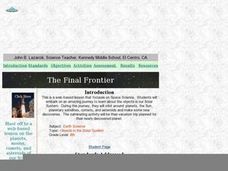Scholastic
Study Jams! Our Solar System: Outer Planets
A set of seven slides presents an artist's rendition of our solar system, specifically, the asteroid belt, Kuiper Belt, and our outer planets: Jupiter, Uranus, and Neptune. The slides are beautiful, and a printable set with text is...
Glynn County School System
The Outer Planets
Are outer planets just like inner planets? Nope! The outer planets are much more spread apart than the inner planets. An informative PowerPoint presentation shows why this is true as well as facts about the individual planets in the...
University of Colorado
Looking Inside Planets
All of the gas giant's atmospheres consist of hydrogen and helium, the same gases that make up all stars. The third in a series of 22, the activity challenges pupils to make scale models of the interiors of planets in order to...
Alabama Learning Exchange
Inner and Outer Planets
Students explore the solar system. In this planets lesson plan, students learn about the other planets in the solar system. They watch a video clip from National Geographic on the solar system, compare and contrast the planets and create...
Laboratory for Atmospheric and Space Physics
The Planets and Scale
Scholars gain an insight into the relative size of planets and distance between inner and outer planets with the help of informational text, a data table, and a series of four questions.
Scholastic
Study Jams! Our Solar System: Inner Planets
Stunning images make up this slide show on the inner planets of our solar system. While visiting Mercury, Venus, Earth, and Mars, viewers also are introduced to the International Space Station and the Spirit Rover on Mars. Follow this...
University of Colorado
Looking Inside Planets
Researchers use scientific data to understand what is inside each of the planets. The first in a series of six, this lesson builds off of that concept by having pupils use a data table to create their own scale models of the interiors of...
Glynn County School System
Solar System Formation and Extra-Solar Planets
Has the solar system always been like it is today? A lesson presentation begins with a discussion of the formation of our solar system. It continues with a compare and contrast of the inner and outer planets.
Curated OER
Exploring the Planets
Students study robotic spacecrafts that have provided detailed information about the inner and outer planets. In this exploring the planets lesson plan, students use posters and diagrams to study the various robotic spacecraft sent to...
Virginia Department of Education
Planet Line-Ups
Should Pluto be considered a planet or a dwarf planet? Scholars research planets in our solar system to understand their similarities and differences. It also includes memory activities related to the order of the planets.
Curated OER
The Outer Planets
Learners study the planets Saturn, Uranus, and Neptune. For this solar system lesson plan, students read facts about the planets and their location in the solar system. Images, diagrams, and background information on the planets is...
Glynn County School System
Our Solar System: An Introductory Tour
Take science lovers on an out-of-this-world tour of the solar system. A PowerPoint presentation gives a pictorial view of the planets of the solar system. Images highlight the unique features of each planet, and the final slides include...
Curated OER
Outer Space Circus
Young scholars investigate the concept of other planets and conduct research using a variety of resources. They focus upon a planet and its gravitation, surface, and atmospheric conditions. The lesson plan contains specific steps for the...
Kelly's Kindergarten
Kelly's Kindergarten: Names of Planets
Need some helpful images for your astronomy unit? Check out a slide show that hosts several pictures of planets with their names.
Laboratory for Atmospheric and Space Physics
Where Are We Going?
Come take a ride on the space bus! Scholars go on an imaginary trip to pick up their peers from the inner and outer planets while reinforcing math skills. First, learners round decimals to identify each planets' distance from Earth....
University of Colorado
Rings and Things
Galileo first observed Saturn's rings in 1610. Through the use of a flashlight and baby powder, classes see how they can observe the rings of the outer planets from far away. Another demonstration shows how these rings, made of ice and...
University of Colorado
Modeling Sizes of Planets
The density of the huge planet of Saturn is 0.7 g/cm3, which means it could float in water! In the second part of 22, science pupils explore the size and order of the planets. They then calculate weight and/or gravity and density of...
Laboratory for Atmospheric and Space Physics
Space Travel Guide
Looking to take a trip? Why not go to space? Here, scholars take on the role as travel agent to create a guide to their favorite planet including travel tips and sightseeing recommendations.
Curated OER
E.T., Are You Out There?
Research the necessary components of a planet that supports life after reading the article "All of a Sudden, The Neighborhood Looks a Lot Friendlier" from The New York Times. After finding their information, middle and high schoolers...
Curated OER
What's "Out" There?
First graders investigate the five outer planets. In this space science lesson plan, 1st graders read the book Our Solar System and identify the five outer planets. Students create a booklet and write about outer planets.
Curated OER
A Trip To Outer Space: Planet Exchange
Students examine the different planets in outer space. Each class studies a different planet and creates a scavenger hunt for the other classes to explore that planet.
Curated OER
Planets in Our Solar System
Second graders research climate and landforms on nine planets in our solar system, choose one planet to visit, gather information about their chosen planet's climate and landforms, and "invent" space suit that would enable them to...
Curated OER
Observing the Outer Planets
Students observe the outer planets. In this science activity, students use a telescope locate the outer planets of the solar system. Students create a video of their observations.
Laboratory for Atmospheric and Space Physics
A Classroom Solar System
Create a scaled model of our solar system in your classroom! Scholars work collaboratively to build paper mache planets and hang them in their proper position to showcase each planet's location in the solar system.























